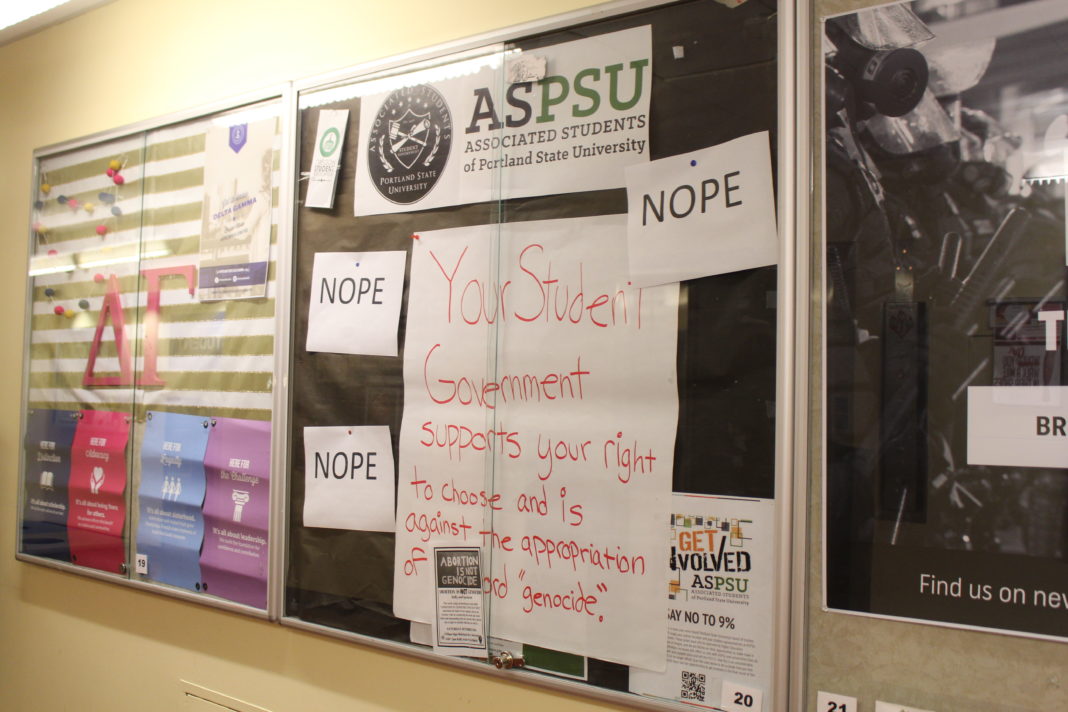Portland State and KATU news hosted a community town hall meeting to discuss homelessness in Portland on Tuesday, Oct.17 in Smith Memorial Student Union. The event was part of PSU’s yearly Portland State of Mind week.
Expert panelists fielded audience questions and suggestions about affordable housing, rent control, drug and alcohol addiction, mental illness, and the impact of homelessness in residential areas.
The final consensus was not surprising: more needs to be done.
However, the specifics of that consensus didn’t sit well with everyone. Toward the end of the one-hour discussion, one disgruntled downtown Portland homeowner asked, “What about us?” to a jeering audience.
PSU has been hosting televised town halls for the last seven years. Present on the panel were Multnomah County Chair Deborah Kafoury, Dean of PSU and Oregon Health and Science University’s joint School of Public Health Dr. David Bangsberg, Initiative Director of A Home for Everyone Marc Jolin, and Ellie Hayes, a formerly homeless Portlander who now works at a local shelter.
Audience members ranged from those currently experiencing homelessness to neighborhood association members worried about their kids’ safety, to homeless advocates and PSU student activists.
PSU President Dr. Rahmat Shoureshi kicked off the event with by discussing numbers regarding homelessness. In the 2017 federal Point-in-Time homeless survey, as analyzed by PSU’s College of Urban and Public Affairs, there are at least 4,177 people living on Portland’s streets right now. That’s a 10 percent increase from 2015, “which means the problem is getting worse,” Shoureshi said.
While those numbers have grown over time, “the impact homelessness has had on a person’s life has not changed in the last 20 years,” Jolin said. Jolin also brought up the larger number of people with “significant” disabilities that are now living on the streets in addition to the increasing population of those who are chronically homeless. People who are chronically homeless have been homeless for at least a year or many times over a three-year period.
According to Hayes, long-term homelessness causes children stress at school, “long-term trauma,” and “makes it hard for kids to be able to connect with people and connect in their schools and their communities.”
Further, added Bangsberg, a new homeless population has emerged in the last several years. “We have seen a doubling in the number of people who are homeless that are 55 or older,” Bansgberg said.
Bangsberg explained how this new homeless population might “work service industry jobs, [do] not have pensions, [have] not been able to save enough for retirement, [or] have an illness or some life event that makes them fall behind on bills.”
“Once they’re on the streets,” Bangsberg added, “their mental health deteriorates, [and] they may use substances.”
Panelists stressed that a multi-level approach from community members, government and businesses is what the city needs to solve the housing crisis. The overarching need, however, is more permanent housing.
Portland Mayor Ted Wheeler has signaled a shift away from increasing shelter beds and toward funding more permanent, affordable housing in the city.
But some community members want faster answers.
TJ, an audience member who is part of the Laurelhurst Neighborhood Association, said in the last two weeks she has picked up 31 used syringes from the Laurelhurst Park playground.
“We can’t have the collateral damage to our children’s safety,” TJ stated. She explained that she has heard a lot of talk about affordable housing but not enough about addiction and mental health treatment. TJ pointed to mobile mental health centers and safe injection sites in other cities as possible solutions.
“I understand the safety concern,” Bangsberg said. However, mental health and addiction treatment services “are best delivered with a stable place to live, linked with intense case management and vocational services,” Bangsberg added.
“Addiction, mental illness and poverty are not crimes,” Bangsberg stressed. “When you’re homeless, you’re struggling and in pain.”
According to Bangsberg, the United States’ federal funding for affordable housing has fallen since the 1980s. This brought up audience questions about private businesses’ responsibilities in subsidizing affordable housing, zoning requirements and rent control.
Kafoury said Portland City Council was slated to vote on a new measure that would add 2,000 units of affordable housing in the next 10 years. This comes in addition to the $258 million affordable housing bond Portlanders voted for last November. The council will begin voting on the specifics of that bond next week.
As for rent control, Kafoury said someone has brought the issue of capping rents to the Oregon Legislature almost every session for the last 15 years.
“Unfortunately the market forces are so strong right now that holding down rents for some people while rents are going up for other people [would] create a whole other set of issues,” Kafoury said.
While other audience members brought up solutions like sleeping pods and safe rest areas like those in Eugene, Hayes reminded the crowd why permanent housing mattered most to those struggling with homelessness.
“You could be living in a shelter and you can be living at rest places…but that’s not going to get you really what you need,” Hayes said. “You need to be housed so that you can have a point of reference, [a] place to come back to, and your own little space to be able to work from.”
When an audience member complained that homeless people “don’t pay taxes” to the dismay of many in the room, Hayes responded again.
“I didn’t pay taxes when I was homeless,” Hayes said, but the “wrap-around services” in the community allowed her to keep her baby, graduate college, and now, give back to the community.
While services such as the 211 information line, winter warming and summer cooling shelters, and mobile mental health services are always available, Jolin said such resources are often overstretched.
That’s why, said Kafoury, “we need to be big and we need to be bold. [I] need you all to demand from your government and demand from your business community and demand from your neighbors that…we need supportive housing and supportive services for the people that are suffering on the streets.”
When asked if she believed Portland would solve its housing crisis, Hayes said, “I have absolute faith that this is solvable. If I didn’t think it was fixable, I wouldn’t be here.”







Portugal is held up as the gold standard for “decriminalizing” drugs and not “judging” the addict. Their programs has some success due to wrap-around services and is mandatory. Drug dealing is still illegal and dealt with harshly. Other EU countries tried to emulate the program. With the 2008 recession, their budgets were slashed for the addicts in program and caused overdoses, increased crime, and increased disease transmission, increased homelessness. Can you see us having an Injections Site AND wrap-around services? I don’t believe there will be funding for both. Why not use any proposed funding and increase needed detox/rehab facilities and sober living environments along with all the needed physical/mental health and social services. The way I see it, Injections Sites are prolonging the suffering and misery of the addict with the usual end result of death. Which would be more compassionate?
http://www.vancouversun.com/little+evidence+harm+reduction+reduces+harm+more+than+good/8679087/story.html?fref=gc&dti=189308553419
“The four pillar approach only works when each pillar is properly funded. Prevention reduces the flow of people into addiction. Treatment reduces the number of addicts including those living in the DTES. Policing keeps a lid on the open drug dealing and the affects of the associated problems on the community. Only after these three pillars are properly funded can we afford to spend money on Harm Reduction initiatives that do not encourage abstinence. Putting HR first is like running up debt on your credit card and never paying more than your minimum payments.”
http://www.globaldrugpolicy.org/Issues/Vol%201%20Issue%203/A%20Critical%20Evaluation.pdf
THE JOURNAL OF GLOBAL DRUG Policy AND PRACTICE
A Critical Evaluation of the Effects of Safe Injection Facilities
Garth Davies, Simon Fraser University
Conclusion: Taking Causality Seriously
On the subject of the effects of SIFs, the available research is overwhelmingly positive. Evidence can be found in support of SIFs achieving each of the goals listed at the beginning of the evaluation. In terms of our level of confidence in these studies,the assessment offered here is far less sanguine. In truth,none of the impacts attributed to SIFs can be unambiguously verified. As a result of the methodological and analytical problems identified above, all claims remain open to question.
http://www.hc-sc.gc.ca/ahc-asc/pubs/_sites-lieux/insite/index-eng.php
Vancouver’s INSITE service and other Supervised injection sites: What has been learned from research?
Final report of the Expert Advisory Committee
http://www.kiro7.com/news/local/councilwomans-idea-for-seattle-safe-injection-site-locations-belltown-lake-city/466411868
“At the Vancouver site, the manager said since opening in 2003, the overdose death rate in the area around the clinic has dropped 35 percent. But the clinic also estimates 15 to 20 percent of people using the site come from other parts of the country specifically for it.”
http://www.seattletimes.com/seattle-news/health/is-vancouvers-safe-drug-use-site-a-good-model-for-seattle/
“Although research appears to bear that out, many of the studies that attest to Insite’s success are small and limited to the years after the center opened. For instance, a 2011 study published in the journal The Lancet found a 35 percent reduction in overdose deaths in the blocks surrounding Insite, versus 9 percent in the rest of Vancouver.
But that often-cited study looked only at the period two years before and two years after the center opened, not the ensuing decade.”
http://www.seattletimes.com/seattle-news/health/is-vancouvers-safe-drug-use-site-a-good-model-for-seattle/
“Although Insite is paired with a drug-treatment center, called Onsite, Berner and other critics point out that completion rates are low. Of the 6,500 people who visited Insite last year, 464 were referred to Onsite’s detox center. Of those, 252 finished treatment.”
The Vancouver Insite was placed in a crime-ridden, drug-ridden, low-income neighborhood. It only got worse.
http://www.seattletimes.com/seattle-news/health/is-vancouvers-safe-drug-use-site-a-good-model-for-seattle/
“Although the Insite center is a model, the Vancouver neighborhood surrounding it is nothing to emulate, advocates acknowledged.
“If I came from a city like Seattle and I went to that Insite place, it would scare the hell out of me,” Kral said. “I would think, ‘Are we going to create one of those?’ ””
http://news.nationalpost.com/news/vancouvers-gulag-canadas-poorest-neighbourhood-refuses-to-get-better-despite-1m-a-day-in-social-spending
Vancouver’s ‘gulag’: Canada’s poorest neighbourhood refuses to get better despite $1M a day in social spending
What do you think would happen if this was placed in a middle-class neighborhood, or, ANY neighborhood?
https://www.youtube.com/watch?v=audzsuRMWBE&t=586s
https://www.youtube.com/watch?v=wwJkqTZ5H_s
http://news.nationalpost.com/news/canada/brian-hutchinson-thousands-of-used-drug-needles-have-become-the-new-normal-for-vancouver
4/27/2016
Brian Hutchinson: Finding used drug needles in public spaces has become the new normal for Vancouver
http://www.huffingtonpost.ca/mark-hasiuk/insite-vancouver_b_3949237.html
“Ten years later, despite any lofty claims, for most addicts, InSite’s just another place to get high.”
The 100% positive studies on Vancouver’s Insite (Safe Injection Facility) was done “Early last decade, Montaner and Kerr lobbied for an injection site. In 2003, the Chretien Liberals acquiesced, gave the greenlight to B.C.’s Ministry of Health, which, through Vancouver Coastal Health, gave nearly $1.5 million to the BC Centre (that’s Montaner and Kerr, you remember them) to evaluate a three-year injection site trial in Vancouver.
I asked him about the potential conflict of interest (lobbyists conducting research) and he ended the interview with a warning. “If you took that one step further you’d be accusing me of scientific misconduct, which I would take great offense to. And any allegation of that has been generally met with a letter from my lawyer.”
Was I being unfair? InSite is a radical experiment, new to North America and paid for by taxpayers. Kerr and company are obligated to explain their methods and defend their philosophy without issuing veiled threats of legal action.”
In the media, Kerr frequently mentions the “peer review” status of his studies, implying that studies published in medical journals are unassailable. Rubbish. Journals often publish controversial studies to attract readers — publication does not necessarily equal endorsement. The InSite study published in the New England Journal of Medicine, a favourite reference of InSite champions, appeared as a “letter to the editor” sandwiched between a letter about “crush injuries” in earthquakes and another on celiac disease.”
Really? What kind of “science” produces dozens of studies, within the realm of public health, a notoriously volatile research field, with positive outcomes 100 per cent of the time? Those results should raise the eyebrows of any first-year stats student.”
And who’s more likely to be swayed by personal bias? InSite opponents, questioning government-sanctioned hard drug abuse? Or Montaner, Kerr and their handful of acolytes who’ve staked their careers on InSite’s survival? From 2003 to 2011, the BC Centre received $2,610,000 from B.C. taxpayers to “study” InSite. How much money have InSite critics received?”
There has never been an independent analysis of InSite, yet, if you base your knowledge on Vancouver media reports, the case is closed. InSite is a success and should be copied nationwide for the benefit of humanity. Tangential links to declining overdose rates are swallowed whole. Kerr’s claims of reduced “public disorder” in the neighbourhood go unchallenged, despite other mitigating factors such as police activity and community initiative. Journalists note Onsite, the so-called “treatment program” above the injection site, ignoring Onsite’s reputation among neighbourhood residents as a spit-shined flophouse of momentary sobriety.”
http://www.hc-sc.gc.ca/ahc-asc/pubs/_sites-lieux/insite/index-eng.php
Reducing the Transmission of Blood-Borne Viral Infections & Other Injection Related Infections
“Self-reports from users of the INSITE service and from users of SIS services in other countries indicate that needle sharing decreases with increased use of SISs. Mathematical modeling, based on assumptions about baseline rates of needle sharing, the risks of HIV transmission and other variables, generated very wide ranging estimates for the number of HIV cases that might have been prevented. The EAC were not convinced that these assumptions were entirely valid.
SISs do not typically have the capacity to accommodate all, or even most injections that might otherwise take place in public. Several limitations to existing research were identified including:
Caution should be exercised in using mathematical modelling for assessing cost benefit/effectiveness of INSITE, given that:
There was limited local data available regarding baseline frequency of injection, frequency of needle sharing and other key variables used in the analysis;
While some longitudinal studies have been conducted, the results have yet to be published and may never be published given the overlapping design of the cohorts;
No studies have compared INSITE with other methods that might be used to increase referrals to detoxification and treatment services, such as outreach, enhanced needle exchange service, or drug treatment courts.
Some user characteristics relevant to understanding their needs and monitoring change have not been reported including details of baseline treatment histories, frequency of injection and frequency of needle sharing.
User characteristics and reported changes in injection practices are based on self-reports and have not been validated in other ways. More objective evidence of sustained changes in risk behaviours and a comparison or control group study would be needed to confidently state that INSITE and SISs have a significant impact on needle sharing and other risk behaviours outside of the site where the vast majority of drug injections still take place.”
“It has been estimated that injection drug users inject an average six injections a day of cocaine and four injections a day of heroin. The street costs of this use are estimated at around $100 a day or $35,000 a year. Few injection drug users have sufficient income to pay for the habit out through employment. Some, mainly females get this money through prostitution and others through theft, break-ins and auto theft. If the theft is of property rather than cash, it is estimated that they must steal close to $350,000 in property a year to get $35,000 cash. Still others get the money they need by selling drugs.”
http://www.vancouversun.com/little+evidence+harm+reduction+reduces+harm+more+than+good/8679087/story.html?fref=gc&dti=189308553419
“In addition, the federal government’s Advisory Committee on Drug Injection Sites report only five per cent of drug addicts use the injection site, three per cent were referred for treatment and there was no indication the crime rate has decreased, as well as no indication of a decrease in AIDS and hepatitis C since the injection site was opened.”
https://www.scientificamerican.com/article/massive-price-hike-for-lifesaving-opioid-overdose-antidote1/
Massive Price Hike for Lifesaving Opioid Overdose Antidote
Suddenly in demand, naloxone injector goes from $690 to $4,500
Should we follow the money? Who would be profiting bigly from the increased use of naloxone?
https://www.bramptonguardian.com/community-story/7520683-money-and-resources-for-drug-rehabilitation-sorely-needed-in-peel-say-advocates/
“Setting up free injection sites to deal with the recent spate of drug overdoses does not address the root of the opioid problem, says Ted Brown, executive director of Brampton’s Regeneration Outreach Community.
Instead, Queen’s Park and other tiers of governments should consider investing resources and dollars toward rehabilitation programs to help those dealing with addiction and mental health issues, said Brown. ”
http://www.bcmj.org/premise/supervised-injection-sites%E2%80%94-view-law-enforcement
Supervised injection sites—a view from law enforcement
Jamie Graham, former chief of Vancouver Police has outlined the successful model of dealing with an epidemic: Support, mandatory treatment, abstinence, and counseling as all part of the solution. My recover(ed)(ing) addict friends say they would agree.
https://mosaicscience.com/story/iceland-prevent-teen-substance-abuse
Iceland knows how to stop teen substance abuse but the rest of the world isn’t listening
In Iceland, teenage smoking, drinking and drug use have been radically cut in the past 20 years. Emma Young finds out how they did it, and why other countries won’t follow suit.
http://www.vancouversun.com/little+evidence+harm+reduction+reduces+harm+more+than+good/8679087/story.html?fref=gc&dti=189308553419
“The current campaign reports significant reductions in drug overdoses, yet the Government of British Columbia Selected Vital Statistics and Health Status Indicators show that the number of deaths from drug overdose in Vancouver’s Downtown Eastside has increased each year (with one exception) since the site opened in 2003.”
https://www.usatoday.com/story/news/nation-now/2017/05/05/pigeon-nest-needles-highlights-vancouvers-drug-problem/101323878/
Pigeon nest of needles highlights Vancouver’s drug problem
Some graphs about how overdoses in Vancouver, BC have increased:
https://uploads.disquscdn.com/images/4937e3e285c02900541696be294c99859dd986654fc2ea3b3b1f41f673618dc7.png
One more: https://uploads.disquscdn.com/images/d2f8aa542d4033a1f198a3b0e3e802482a4becf1e45b04e77079e989e5c6460a.jpg
The “Safe” Injection Movement is sponsored by the Drug Policy Alliance, an advocacy group that works to decriminalize drugs and is funded largely by billionaire George Soros. The group has pushed, thus far unsuccessfully, for similar legislation in New York, Maryland, Massachusetts and Vermont.
Here’s some examples of their thinking:
http://www.nadcp.org/sites/default/files/2014/NADCP%20Initial%20Response%20to%20DPA%20and%20JPI%20Reports.pdf
http://www.nadcp.org/sites/default/files/nadcp/NADCP%20Response%20to%20DPA%20and%20JPI%20Media%20Attacks%20on%20Drug%20Courts.pdf